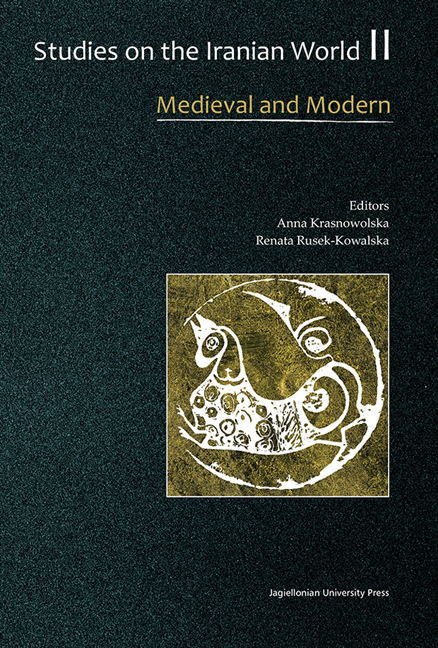Book contents
- Frontmatter
- Contents
- Foreword
- Linguistics
- Literature
- Timurid Authority and the Ottoman Sultan: Some Notes on Three Jāmi Manuscripts from the Library of Bayezid II (886–918/1481–1512)
- The Historical Novel in Early Modern Persian Literature
- Sibā-Zeynab-Zibā: the Metamorphoses of an Iranian Woman
- Laughing at Adultery in Persian Literature and Culture
- Quiet Lives and Looming Horrors – Subversive Narrative Strategies in the Earliest Short Stories of Zōyā Pīrzād
- Religion
- History
- Arts
- Social and Cultural Studies
Laughing at Adultery in Persian Literature and Culture
from Literature
Published online by Cambridge University Press: 12 January 2018
- Frontmatter
- Contents
- Foreword
- Linguistics
- Literature
- Timurid Authority and the Ottoman Sultan: Some Notes on Three Jāmi Manuscripts from the Library of Bayezid II (886–918/1481–1512)
- The Historical Novel in Early Modern Persian Literature
- Sibā-Zeynab-Zibā: the Metamorphoses of an Iranian Woman
- Laughing at Adultery in Persian Literature and Culture
- Quiet Lives and Looming Horrors – Subversive Narrative Strategies in the Earliest Short Stories of Zōyā Pīrzād
- Religion
- History
- Arts
- Social and Cultural Studies
Summary
SUMMARY
The current essay tries to shed light to a complicated and challenging aspect of Iranian culture, also reflected in Persian literature. The cliché image attributed to women focuses rather on their infidelity and untrustworthiness. A large series of Persian anecdotes talk of women's guiles and tricks. Meanwhile, although the act of adultery is an unforgivable sin and it is punished to death in Iran, retelling it brings laughter to the audience. Such mocking look over the matter has resided in Iranian culture up to our modern times. This paper is an endeavor to discover the causes of laughter and what it hides behind itself.
Iranian people mostly appreciate irony and sense of humor in their mode of life and of course, express it by means of their language. Living under social and political pressure, they make numerous jokes about daily challenges and inject them regularly into Iranian live culture. The satiric view reflected in Persian language is not a matter of modern time, but an aspect that has lasted for hundreds of years. We still perceive the sense of humor concealed in works of Iranian literary masters, as in poems of Hâfez or anecdotes from Sa'di and ’Obeyd Zâkâni.
A tangible example on this issue (not willing to be offensive to anyone) could be Rashti jokes. Rasht is a city of the northern province of Gilan, near to the Caspian Sea and its residents are called Rashti. In Iranian contemporary folk culture, people make fun of the imaginary stereotype of Rashti men whose wives get involved into affairs with paramours, while the husbands are either ignorant to their wives’ betrayal, or they are unable to react ‘properly.’
The Persian adjective used to describe a cuckold man is bigheyrat. We may not be able to find a precise equivalent for gheyrat in English language as its meaning concerns zeal, jealousy and honor all at once.
To present a more perceptible instance showing the significance of gheyrat as a virtue for Iranian men, I would refer to a very popular movie from Iranian cinema, Hâmoun, directed by Dâriush Mehrjouyi in 1990. The film tells the story of Hamid Hâmoun, a man belonging to the Iranian middle class – played by Khosro Shakibâee – and his resistance to his wife's demand for divorce.
- Type
- Chapter
- Information
- Studies on the Iranian WorldMedieval and Modern, pp. 99 - 106Publisher: Jagiellonian University PressPrint publication year: 2015



